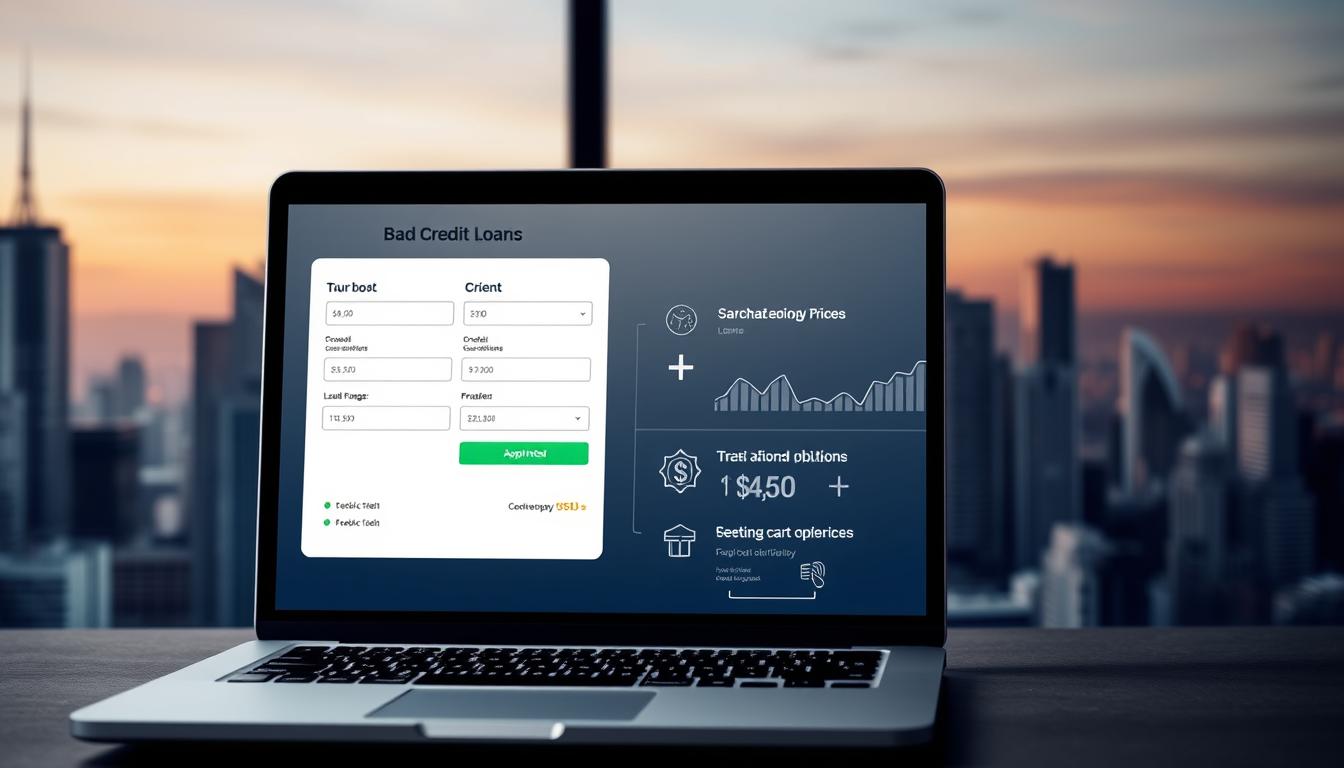Consolidation Loans: Streamline Your Finances
Did you know that nearly 30% of Americans struggle with managing multiple debts? This can lead to financial stress and complexity in keeping track of various due dates and interest rates.
Debt can be overwhelming, but there’s a solution that can simplify your financial life. By combining multiple debts into a single loan, you can potentially lower your interest payments and gain a clearer view of your finances. We will explore how consolidation loans can help streamline your financial obligations.
Key Takeaways
- Consolidating debts into one loan can simplify your finances.
- Lower interest rates may be available with a consolidation loan.
- A single loan can reduce financial stress and complexity.
- You can gain a clearer view of your financial obligations.
- Consolidation loans can potentially save you money on interest.
What Are Consolidation Loans?
A consolidation loan is a personal loan for debt consolidation. It lets you combine many debts into one. This makes managing your debt easier by having one loan with one interest rate and one payment.
You can get a consolidation loan from banks, credit unions, or online lenders like SoFi or LendingClub. This gives you the chance to find the best deal for your situation.
Definition and Overview
Consolidation loans help make debt easier to handle. They can lower your interest rate and monthly payments. But, they don’t get rid of debt; they just make it more manageable.
When looking at consolidation loans, check the terms carefully. Look for good interest rates, flexible payments, and few fees. It’s also key to fix the reasons for your debt to avoid similar problems later.
Types of Consolidation Loans
There are mainly two kinds of consolidation loans: unsecured and secured. Unsecured consolidation loans don’t need collateral and depend on your credit. These loans are riskier for lenders, so they might have higher rates or stricter rules.
Secured consolidation loans need collateral, like a home or car. Since lenders take less risk, these loans might have better rates. But, there’s a big risk of losing your collateral if you can’t pay back the loan.
Knowing the differences between these loans is key to picking the right loan consolidation options for you.
Benefits of Consolidation Loans
Consolidating your loans makes managing your finances easier. If you have credit cards or other debts, they might have different due dates and payment methods. By combining these into one loan, you only have to worry about one monthly payment.
This makes it simpler to handle your money. It also lowers the chance of missing a payment. With just one payment each month, you can better keep track of your money.
Simplified Monthly Payments
One big plus of consolidation loans is the ease of monthly payments. Having one loan to manage makes it simpler to keep track of your money. This reduces the hassle of dealing with many debts.
Lower Interest Rates
Consolidation loans often have better interest rates than some debts, like credit cards. By merging high-interest debts into a loan with a lower interest rate, you save money. This can make your debt cheaper overall.
Who Should Consider Consolidation Loans?
Not everyone is a good fit for consolidation loans. They can make managing your money easier, but they’re not for everyone. It’s important to think if consolidating your debt is the best choice for you.
Ideal Candidates
People with many debts, like credit cards or personal loans, might benefit from consolidation loans. Those who can get a lower interest rate and have one monthly payment can save money. For example, if you have debts with 18% to 25% interest, a 12% rate could save you a lot.
To consolidate debt well, you need a steady income and a good credit score. Lenders like borrowers with good credit because it shows they’re less likely to default. Always check your credit report before applying to avoid any surprises.
Signs You Need Consolidation
If you’re having trouble keeping up with payments or your monthly payments are too high, it’s time to think about consolidation. Other signs include getting lots of calls from creditors or facing late fees. Consolidating your debt can make managing your money easier and might save you money in the long run.
But, be careful. If the interest rate goes up or the monthly payment is too much, it might not be right for you. Always check the terms of any consolidation loan to make sure it fits your financial goals.
How to Choose the Right Consolidation Loan
Choosing the right consolidation loan means comparing different lenders and understanding their terms. It’s important to pick a loan that fits your financial goals.
When looking at lenders, consider their interest rates, repayment terms, and customer service. Comparing lenders helps you find the best one for you.
Comparing Lenders
To compare lenders well, look at these factors:
- Interest rates offered
- Repayment terms and flexibility
- Customer service and support
- Additional fees or charges
Using a lender that also handles your investments or savings might offer multi-product discounts or other benefits.
Evaluating Terms and Conditions
It’s crucial to understand the terms of a consolidation loan. This includes knowing the loan consolidation options and their effects.
Read the loan agreement carefully to know:
- The total cost of the loan
- Any penalties for early repayment
- The repayment schedule and amount
By comparing consolidation loan offers and checking the terms, you can choose wisely for your finances.
The Application Process for Consolidation Loans
Applying for a consolidation loan might seem hard, but it’s easier than you think. We’ll walk you through the steps and what you need to apply for a consolidation loan.
Required Documentation
First, you need to gather all the important documents. You’ll need:
- Identification proof (driver’s license, passport)
- Income verification (pay stubs, tax returns)
- Debt statements (credit card bills, loan documents)
- Bank statements
Having these documents ready makes the application smoother. It helps lenders see if you can handle the loan.
Steps to Apply
The steps to apply for a consolidation loan are simple:
- Prequalification: Visit the loan company’s website to see your prequalified APR. This gives you an idea of the interest rate without hurting your credit score.
- Formal Application: If you like the prequalified terms, apply formally. You’ll need to provide the documents you gathered.
- Review and Approval: The lender will check your application and decide. This might involve a hard credit check, which can temporarily lower your score.
- Loan Disbursement: If you’re approved, the lender will send you the loan. You can then use it to pay off your debts.
Knowing these steps and being ready makes applying for a consolidation loan easier. It’s also key to check the loan terms carefully. Make sure they fit your financial plans.
Understanding Interest Rates
The interest rate on your consolidation loan can greatly affect your monthly payments and financial health. Interest rates are the percentage of your loan amount charged by the lender, in addition to the principal.

Fixed vs. Variable Rates
Consolidation loans can have fixed or variable interest rates. Personal loans are usually fixed-rate. This means the APR stays the same for the loan’s life, making monthly payments consistent.
Variable-rate loans have rates that can change with market conditions. They might start lower than fixed rates but could increase, raising your monthly payments.
Factors Influencing Rates
Several things affect the interest rate on a consolidation loan. Your credit score, the loan amount, and the loan term are key. A higher credit score can lead to lower rates because it shows you’re less risky.
Lenders also look at their costs and risks when setting rates. Market conditions, like changes in the federal funds rate, can influence what lenders offer.
Knowing these factors and the type of interest rate you have can help you make a better choice. It could also save you money over the loan’s life.
Potential Drawbacks of Consolidation Loans
Consolidation loans have many benefits, but they also have downsides. It’s important to know these to decide if a consolidation loan is right for you.
Fees and Charges
One issue with consolidation loans is fees and charges. Some lenders have a sign-up or origination fee. This can increase the loan’s cost. But, there are no-fee options too, with different interest rates based on your credit score.
It’s key to check the loan’s terms and conditions. This way, you’ll know all the costs involved.
- Origination fees can range from 1% to 8% of the loan amount.
- Some lenders offer no-fee consolidation loans, but may charge higher interest rates.
- Balance transfer fees may apply if you’re consolidating credit card debt.
To save money, compare different lenders and loan offers. Carefully evaluating the terms and conditions helps avoid unexpected costs. This ensures you get the best deal.
Risk of Increased Debt
Another risk of consolidation loans is the chance of more debt. Consolidating debt can lead to a longer repayment period or higher total cost. It’s crucial to tackle the debt’s root causes and plan to avoid new debt.
- Create a budget to track your income and expenses.
- Avoid using credit cards or taking on new debt during the repayment period.
- Consider working with a financial advisor to develop a long-term plan.
Knowing these potential drawbacks and how to avoid them helps you use consolidation loans wisely. This way, you can reach your financial goals.
How Consolidation Affects Your Credit Score
Knowing how consolidation impacts your credit score is key to smart financial planning. Consolidation merges several debts into one, with a single interest rate and payment date.
Consolidation can change your credit score in both good and bad ways. At first, your score might drop because of the lender’s inquiry and the new loan. But, making timely payments and lowering your debt can boost your score over time.
Short-Term vs. Long-Term Effects
Getting a consolidation loan might lower your score at first. This is because of the lender’s inquiry and the new loan. It also means your average credit age might go down.
But, consolidation can improve your score in the long run. It makes payments easier to manage, helping you stay on track. If the loan’s interest rate is lower, you’ll save money and pay off debt faster.
Important Considerations
When thinking about consolidation’s impact on your score, consider a few things. Consolidating credit card debt can lower your credit utilization ratio. This can significantly increase your score.
| Factor | Short-Term Impact | Long-Term Impact |
|---|---|---|
| Credit Inquiry | Negative | Neutral |
| New Credit Account | Negative | Positive (if managed well) |
| Payment Simplification | Neutral | Positive |
| Credit Utilization Ratio | Neutral | Positive (if credit card debt is consolidated) |
Understanding these points helps you decide if consolidation is right for you. It also shows how it might change your credit score over time.
Real-Life Success Stories
Many people have found relief through consolidation loans. These loans make managing debt easier, helping them take back control of their finances.

Testimonials from Borrowers
Stories of those who’ve used consolidation loans show its power. For example, Mickey’s story shows how it can help after big life changes.
Some common benefits include:
- Simplified Monthly Payments: Combining debts into one loan with one payment.
- Lower Interest Rates: Consolidation loans often have better rates than individual debts.
- Reduced Financial Stress: Simplifying payments can reduce stress.
Lessons Learned
Those who’ve managed debt with consolidation loans share important lessons. A key one is to carefully evaluate the terms of any loan to match your financial goals.
They also highlight the need to:
- Understand the benefits of consolidation loans and how they fit your situation.
- Research how to get a consolidation loan that meets your needs, comparing options.
- Keep good credit habits after consolidation to avoid debt again.
Learning from these success stories and understanding consolidation loans can help you make smart financial choices.
Frequently Asked Questions
Exploring consolidation loans, it’s key to clear up common questions. People often wonder about this financial choice.
Common Myths vs. Facts
There are many wrong ideas about consolidation loans. Let’s clear up some of these myths:
- Myth: Consolidation loans are only for those with bad credit. Fact: While some lenders help those with lower credit, many offer good deals to those with high scores.
- Myth: Consolidating debts will hurt your credit score. Fact: It might drop a bit at first because of the new inquiry. But, paying on time can boost your score over time.
Getting prequalified for a loan shows what rates you might get. It helps you compare consolidation loan offers better.
Key Terminology Explained
Knowing the terms of consolidation loans is important. Here are some key ones:
- APR (Annual Percentage Rate): This is the total loan cost, including interest and fees, yearly.
- Collateral: An asset used to secure a loan, which can be taken by the lender if you default.
- Debt-to-Income Ratio: This is your monthly debt payments divided by your income. Lenders use it to see if you can repay the loan.
Understanding these terms and facts helps you make better financial choices.
Financial Management Post-Consolidation
After you’ve consolidated your debt, managing your money well is key to staying out of debt. Consolidation makes your finances simpler, but it’s just the start. To do well, you need to make a budget, keep your credit in good shape, and make smart money choices.
Budgeting Tips
First, making a budget is essential. Start by tracking how much you earn and spend. Prioritize things you need like rent, utilities, and food. Then, set aside money for your loan payments and other debts.
For easier budgeting, try the 50/30/20 rule. Use 50% for needs, 30% for wants, and 20% for savings and debt. This helps you enjoy now and plan for later.
Maintaining Good Credit Habits
Keeping your credit in good shape is vital after you’ve consolidated. This means paying on time, using less than 30% of your credit limit, and checking your credit report for mistakes. On-time payments are key to a good score, so set reminders or automate payments.
Avoid new credit checks and keep old accounts open. This helps build a strong credit history. A good credit history makes it easier to get credit when you need it.
| Financial Habit | Benefit |
|---|---|
| Making timely payments | Improves credit score |
| Keeping credit utilization low | Reduces debt and improves credit score |
| Monitoring credit reports | Helps detect errors and prevent identity theft |
By sticking to these budgeting tips and keeping your credit in check, you’ll stay financially healthy after consolidating your debt. Remember, debt consolidation is a tool to help manage your money. It’s up to you to use it wisely.
Additional Resources for Further Learning
To learn more about loan consolidation options and how to get a consolidation loan, check out these resources.
Recommended Reading and Websites
There are many books and websites that can help you understand debt consolidation better. These resources can give you a deeper look into the process. They can also help you make smart choices. For example, you can visit trusted financial websites that have guides on loan consolidation.
Consulting Professional Financial Advisors
For advice on getting a consolidation loan, talk to professional financial advisors. Experts like those at Morgan Stanley can give you advice based on your financial situation. Their clients can reach out to their Financial Advisor for more on debt consolidation strategies.
Using these resources can help you understand consolidation loans better. This way, you can make the best choices for your financial future.









